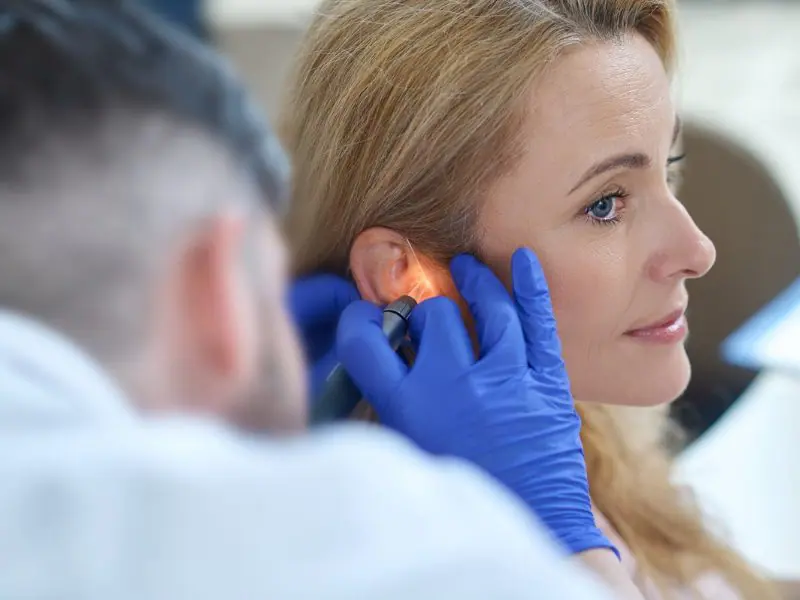How is ear surgery for hearing loss?
Ear surgery for hearing loss can vary based on the specific cause of the hearing impairment. Some surgical procedures aim to address issues with the middle ear, inner ear, or auditory nerve to potentially restore or improve hearing.
Types of ear surgery for hearing loss
Sure, there are several surgical procedures available for treating hearing loss. The type of surgery recommended depends on the cause and severity of the hearing loss. Here are a few surgical options:
Cochlear Implant Surgery
- Purpose: For individuals with severe to profound sensorineural hearing loss who do not benefit from hearing aids.
- Procedure: It involves implanting a device that directly stimulates the auditory nerve.
- How It Works: External components capture sound and transmit it to an internal implant. The implant stimulates the auditory nerve, bypassing damaged hair cells in the cochlea.
- Candidates: Typically recommended for individuals with severe to profound sensorineural hearing loss.
Avamedi offers multiple other services such as Ear Surgery in Iran,Rhinoplasty in Iran, Revision Rhinoplasty in Iran, Brazilian Butt Lift in Iran.
Middle Ear Implants (Ossicular Chain Reconstruction)
- Purpose: Corrects conductive hearing loss caused by problems with the middle ear bones (ossicles).
- Procedure: Involves replacing damaged or missing ossicles with prosthetic devices or bone grafts to improve sound transmission to the inner ear.
- Candidates: Individuals with issues in the middle ear causing conductive hearing loss.
Stapedectomy
- Purpose: For treating otosclerosis, a condition where the stapes bone in the middle ear becomes fixed and causes hearing loss.
- Procedure: Involves removing the fixed stapes bone and replacing it with a prosthesis.
- Candidates: People diagnosed with otosclerosis.
Tympanoplasty
- Purpose: Repairs the eardrum and middle ear structures damaged due to infection, trauma, or other conditions.
- Procedure: Involves reconstructing the eardrum or middle ear structures using tissue grafts.
- Candidates: Individuals with perforated eardrums or damage to the middle ear.
Mastoidectomy
- Purpose: Treats severe ear infections or cholesteatoma, a growth in the middle ear.
- Procedure: Involves removing infected tissue and, if needed, reconstructing damaged structures.
- Candidates: Individuals with chronic ear infections or specific middle ear conditions.
Labyrinthectomy
- Purpose: Treats severe vertigo or Meniere’s disease by removing part or all of the labyrinth (inner ear structures responsible for balance and hearing).
- Procedure: Surgical removal of the affected labyrinth.
- Candidates: Individuals with severe, incapacitating vertigo not responding to other treatments.
Endolymphatic Sac Decompression or Shunt Surgery
- Purpose: Manages Meniere’s disease by reducing fluid pressure in the inner ear.
- Procedure: Creates a drainage pathway or shunt to alleviate fluid buildup.
- Candidates: People with Meniere’s disease experiencing recurrent vertigo attacks and hearing loss.
Minimally Invasive Inner Ear Surgeries
Techniques like laser-assisted procedures or minimally invasive surgeries may be used for certain inner ear conditions, aiming to preserve hearing and minimize trauma to delicate structures.
These surgeries such as ear surgery for hearing loss are specialized and vary in their complexity and suitability based on individual conditions and diagnoses. They should be performed by skilled otologists or ear, nose, and throat (ENT) surgeons after a thorough evaluation and discussion of potential risks and benefits. Always consult with a qualified healthcare professional to determine the most appropriate treatment for your specific inner ear condition.
Procedures for ear surgery for hearing loss
Evaluation and Counseling
Evaluation and counseling are crucial components of medical care, particularly in fields like mental health, hearing, and general healthcare. Here’s an overview of their significance in various contexts:
Medical Evaluation
- Purpose: To assess an individual’s health condition, diagnose any existing issues, and determine the appropriate treatment plan.
- Process: Involves physical examinations, medical history reviews, diagnostic tests, and consultations with healthcare professionals.
- Importance: Enables accurate diagnosis, tracking of health changes, and planning of effective treatments.
Hearing Evaluation
- Purpose: To assess an individual’s hearing abilities and diagnose hearing impairments or disorders.
- Process: Includes audiometric tests, speech perception tests, tympanometry, and other assessments conducted by an audiologist or ENT specialist.
- Importance: Helps identify the type and degree of hearing loss, facilitating the selection of suitable interventions like hearing aids or surgical procedures.
Counseling in Healthcare
- Purpose: Offers guidance, support, and information to individuals dealing with health-related issues or facing medical decisions.
- Areas Covered: Emotional support, lifestyle changes, treatment options, coping strategies, and education about health conditions.
- Importance: Helps patients understand their conditions, make informed decisions, manage stress, and improve overall well-being.
Psychological Counseling
- Purpose: Addresses mental health concerns, emotional distress, behavioral issues, or relationship difficulties.
- Approaches: Cognitive-behavioral therapy (CBT), psychotherapy, counseling sessions, and other specialized interventions.
- Importance: Provides tools to manage emotions, develop coping skills, and improve mental health outcomes.
Benefits of ear surgery for hearing loss
- Empowerment: Enables informed decision-making and active participation in one’s health management.
- Support: Offers emotional and psychological support during challenging times.
- Education: Provides information to understand health conditions and the importance of treatment adherence.
Evaluation and counseling serve as pillars in healthcare, ensuring comprehensive care by addressing physical, mental, and emotional aspects of health and well-being. They contribute significantly to improved patient outcomes and overall quality of life.
What to Expect During ear surgery for hearing loss?
What to expect during ear surgery for hearing loss can vary significantly depending on the type of surgery, its complexity, and the healthcare facility where it’s performed.
Pre-Surgery ear surgery for hearing loss
Preparation:
- Medical Evaluation: You’ll undergo evaluations, tests, and screenings to ensure you’re fit for surgery.
- Instructions: The healthcare team will provide guidelines regarding fasting, medications, and other pre-operative preparations.
- Consent: You’ll sign consent forms after discussing the procedure, risks, and benefits with your surgeon.
Day of Surgery:
- Check-in: Arrive at the hospital or surgery center at the designated time.
- Preparation: You’ll change into a surgical gown and may receive an IV line for medications or fluids.
- Anesthesia: An anesthesiologist will administer anesthesia, which may be general (puts you to sleep), local (numbs a specific area), or regional (numbs a larger portion of the body).
During Surgery:
Operating Room (OR):
- Surgical Team: Surgeons, nurses, anesthesiologists, and other specialists will be present.
- Monitoring: Vital signs, anesthesia, and other factors will be closely monitored throughout the procedure.
- Procedure: The ear surgery for hearing loss will be performed according to the planned approach discussed with you beforehand.
Post-Operation:
- Recovery Room: You’ll be transferred to a recovery area to wake up from anesthesia.
- Monitoring: Medical staff will monitor your condition, vital signs, and pain levels.
- Observation: Depending on the ear surgery for hearing loss , you might spend hours or days in the hospital for observation.
What to Expect After Surgery?
After surgery, the post-operative phase is critical for recovery and healing. Here’s a general overview of what you might expect after ear surgery for hearing loss:
Immediate Post-Operative Period:
Recovery Room:
- Monitoring: You’ll be closely monitored as you wake up from anesthesia.
- Vital Signs: Blood pressure, heart rate, and other vital signs will be checked frequently.
- Pain Management: Medications will be administered to manage post-operative pain or discomfort.
Hospital Room or Discharge:
- Transition: If staying in the hospital, you’ll be transferred to a room for continued recovery. If discharged, you’ll receive specific instructions for at-home care.
- Pain Management: You’ll continue pain management based on prescribed medications.
Early Days After Surgery:
Pain and Discomfort:
Medication: Follow the prescribed pain management regimen as directed by your healthcare provider.
Rest and Recovery: Adequate rest is crucial for the initial recovery period.
Wound Care and Dressings:
Care Instructions: Follow specific wound care instructions provided by your surgeon or healthcare team.
Dressings: They might need to be changed regularly as per the instructions.
Activity Level:
Mobility: Depending on the ear surgery for hearing loss, you might be encouraged to start moving around gradually.
Restrictions: Some activities might be restricted to prevent complications. Follow the guidelines provided by your surgeon.
Days to Weeks After Surgery:
Follow-Up Appointments:
Post-Op Visits: Attend scheduled follow-up appointments to monitor healing and address any concerns.
Stitches or Staples Removal: If applicable, they might be removed during follow-up visits.
Gradual Recovery:
Resuming Activities: Gradually return to regular activities as permitted by your surgeon.
Physical Therapy or Rehabilitation: Some surgeries(may be like ear surgery for hearing loss) might require rehabilitation or physical therapy for optimal recovery.
Diet and Nutrition:
Dietary Guidelines: Follow any dietary restrictions or guidelines provided by your healthcare provider.
Hydration: Ensure adequate hydration unless advised otherwise.
Recovery Timeline:
Varies by Surgery:
Healing Time: The duration of recovery varies based on the type and complexity of the surgery.
Return to Normal Activities: The timeline for resuming normal activities will be provided by your surgeon.
Monitoring and Signs of Concern:
Watch for:
Infection Signs: Redness, swelling, increased pain, or drainage from the incision site.
Fever: Contact your healthcare provider if you develop a fever.
Abnormal Symptoms: Any unusual symptoms or concerns should be reported promptly.
It’s essential to strictly follow the post-operative instructions provided by your healthcare team. Always contact your surgeon or healthcare provider if you have any questions, experience concerning symptoms, or need further guidance during your recovery.
Laser surgery for hearing loss
As of my last update in January 2022, laser use for ear surgery for hearing loss isn’t a common or primary treatment option. Surgical interventions for hearing loss typically focus on addressing specific issues related to the ear’s anatomy or function, such as otosclerosis, tympanic membrane repair, cochlear implants, or middle ear infections.
Laser technology has been used in some ear surgeries such as ear surgery for hearing loss, particularly for precise and minimally invasive procedures. However, its direct application for treating hearing loss is limited. Laser surgery might be employed in certain cases for:
Otosclerosis:
Procedure: Laser stapedotomy or stapedectomy may be performed to address otosclerosis, a condition where the stapes bone becomes fixed.
Process: Laser energy is used to precisely remove or reshape the affected bone, allowing for improved sound transmission to the inner ear.
Tympanic Membrane Repair:
Procedure: Laser-assisted tympanoplasty or myringoplasty might be used to repair perforated eardrums.
Process: Laser technology aids in precise tissue removal or grafting to repair the damaged eardrum.
Middle Ear Conditions:
Laser technology might assist in procedures targeting specific middle ear conditions, infections, or abnormalities with minimally invasive techniques.
However, the use of lasers in ear surgeries is determined on a case-by-case basis by ear, nose, and throat (ENT) specialists or otologists based on the patient’s condition and the specifics of the surgery needed.
It’s crucial to consult with a qualified ENT specialist or otologist to determine the most suitable treatment approach for your hearing loss. They can provide a comprehensive evaluation and discuss the available options, which may or may not involve laser surgery, based on your specific diagnosis and needs.




















